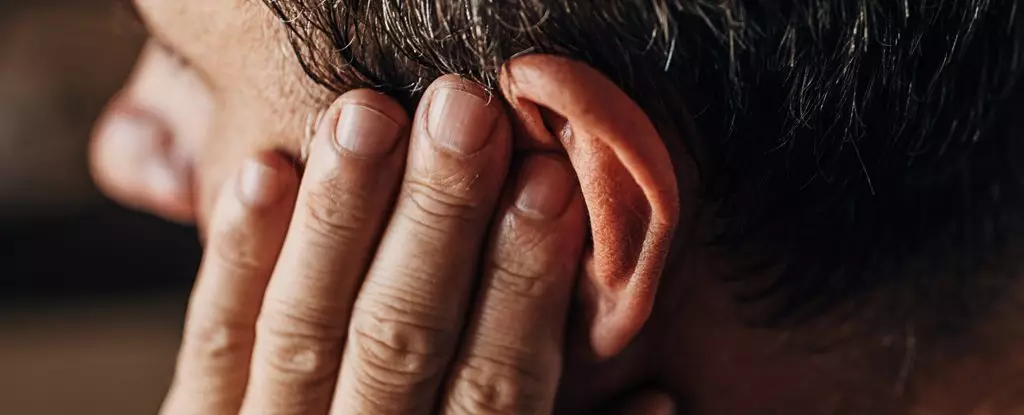Tinnitus, a condition affecting approximately 15% of the global population, manifests as a persistent perception of sound—often described as ringing or buzzing—without any external source. This condition frequently coexists with hearing loss and can severely impact an individual’s mental health, leading to increased stress and depression, particularly for those enduring it for extended periods. As of now, a definitive cure for tinnitus remains elusive, heightening the urgency to discover better management strategies. Recent studies suggest that the interconnectedness between sleep and tinnitus may provide insights into effective treatment avenues.
Understanding tinnitus requires an exploration of its dual existence within the human experience. At its core, tinnitus is classified as a phantom percept—an auditory experience generated by the brain, rather than an external stimulus. While most individuals typically experience phantom perceptions during sleep, those with tinnitus encounter these sounds while awake, which can be both perplexing and distressing. This environment of continuous sound perception leads to alterations in brain activity, particularly in areas responsible for auditory processing. This phenomenon raises questions about the neurological underpinnings of tinnitus and how sleep might interact with these pathways.
A pivotal area of research is examining the relationship between sleep mechanisms and tinnitus. Sleep is not a uniform state; rather, it comprises various stages, each with distinct characteristics. Among these, slow-wave sleep (SWS) or deep sleep stands out as a crucial stage for neuronal recovery and overall cognitive functioning. During slow-wave sleep, a coordinated pattern of brain activity occurs, characterized by synchronized neural oscillations across multiple brain regions—particularly those associated with memory and sensory processing.
Interestingly, findings suggest that not all brain regions exhibit uniform slow-wave activity. In some cases, specific areas may become hyperactive, disrupting the restorative benefits of sleep. This overactivity in auditory regions may suggest that individuals with tinnitus face additional challenges during sleep, potentially leading to heightened instances of sleep disturbances and night terrors compared to their non-tinnitus counterparts. The disrupted sleep landscape experienced by tinnitus patients underscores the significant impact that this condition has on overall quality of life.
Tinnitus often results in individuals spending an increased amount of time in light sleep rather than achieving the deep, restorative sleep essential for recovery. Research indicates that while tinnitus patients may experience less slow-wave sleep on average, certain aspects of deep sleep might remain unaffected. This paradox suggests that despite the overall disruption in sleep quality, some restorative processes continue during deep sleep, potentially providing a window of opportunity for therapeutic interventions.
The body of research highlights that neuronal activity during deep sleep may work to suppress tinnitus. This consideration is anchored in the idea that neurons shift into a restorative state after prolonged wakefulness, which may create a conducive environment for suppressing hyperactive auditory pathways. By promoting deep sleep, it might be possible to leverage the brain’s natural mechanisms to mitigate tinnitus sensations.
Potential Therapies and Research Directions
The implications of these findings open up new pathways for therapeutic strategies focused on sleep enhancement to alleviate tinnitus symptoms. Sleep restriction paradigms, where individuals are encouraged to retire only when genuinely fatigued, may offer a method to bolster slow-wave activity and improve overall sleep quality. This manipulation of sleep patterns could provide critical insights into the fluctuating intensity of tinnitus and its relationship with neural activity.
Moreover, further investigations into the other stages of sleep, notably rapid eye movement (REM) sleep, could yield additional insights. By monitoring both sleep stages and tinnitus activity concurrently, researchers can examine patterns of brain activity that delineate the interaction between sleep and tinnitus, ultimately guiding the development of innovative and effective treatment methods.
While the interplay between tinnitus and sleep presents a complex tapestry of neuronal activity and subjective experience, it also offers a promising avenue for research aimed at enhancing the quality of life for millions affected by this condition. Understanding how sleep mechanics can influence tinnitus not only furthers our grasp of the condition itself but also positions sleep therapies as potential lifelines for sufferers. By continuing to unravel the mysteries surrounding tinnitus and its relationship with sleep, the medical community may uncover strategies that bridge the gap between symptom management and improved well-being, ultimately paving the way for a brighter future for individuals living with tinnitus.

